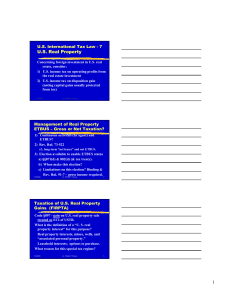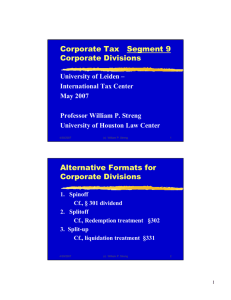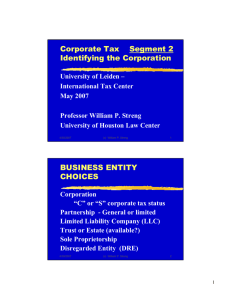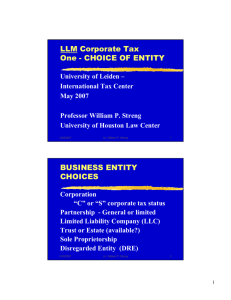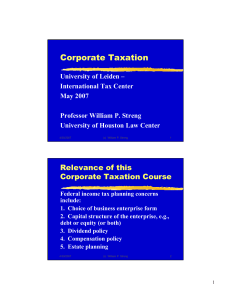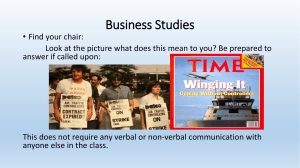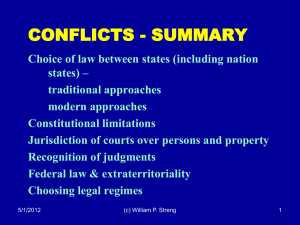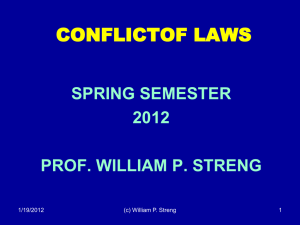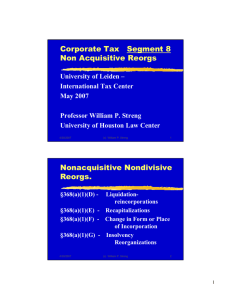CH. 19 Business Purchase/Sale At Death
advertisement
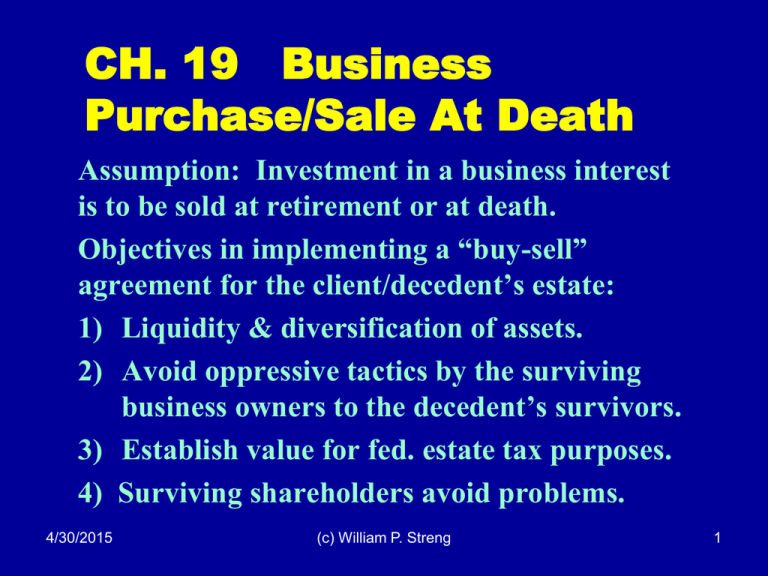
CH. 19 Business Purchase/Sale At Death Assumption: Investment in a business interest is to be sold at retirement or at death. Objectives in implementing a “buy-sell” agreement for the client/decedent’s estate: 1) Liquidity & diversification of assets. 2) Avoid oppressive tactics by the surviving business owners to the decedent’s survivors. 3) Establish value for fed. estate tax purposes. 4) Surviving shareholders avoid problems. 4/30/2015 (c) William P. Streng 1 Advisor’ Conflict of Interest Risk p.2 Who is the client? Who does the lawyer represent in implementing the buy-sell agreement? 1) The business itself? 2) The deceased owner & the owner’s estate? 3) The surviving (unrelated) owners? How solve this conflict of interest issue? Is a written consent sufficient? 4/30/2015 (c) William P. Streng 2 Types of Sales/Purchase Deals – Basic Issues p.3 In the corporate stock ownership context: 1) Stock redemption arrangement – sale of stock back to the issuer. 2) Cross-purchase arrangement – sale of the share interests between the shareholders. 3) Combination of options 1 and 2. Also: 1) How establish the price? 2) How pay for the price as established? 4/30/2015 (c) William P. Streng 3 Stock Redemption Plan p.3 How fund the obligation of the corporation to purchase shares after death of the shareholder? 1) Retain funds? Risk of “accumulated earnings tax” imposed on the corporation? 2) Insurance policy owned by the corporation? How many policies necessary if multiple shareholders? Income tax exclusion if insurance proceeds are received by the corporation? 3) State corporate law (TBOC) restrictions on funds disbursements by the corporation? 4/30/2015 (c) William P. Streng 4 Stock Redemption Plan – Exchange Treatment? Can the shareholder get “sale or exchange” treatment (or “dividend” distribution)? 1) §302(b)(1) – not essentially equivalent to a dividend? 2) §302(b)(2) – a substantially disproportionate distribution? 3) §302(b)(3) – complete termination? Why “sale or exchange” - §1014 basis step-up & zero gain realized vs. dividend treatment. Remember: §318 constructive ownership rules. 4/30/2015 (c) William P. Streng 5 PLR 201228012 (retirement ruling) p.6 Stock gift prior to retirement & then stock redemption for a promissory note: 1) Less than 15 years note & no subordination. 2) No contingent payments & no continuing interest in the corporation. 3) Isolated transaction. 4) No §318 attribution to the redeeming parent. 5) Installment sales eligibility. Therefore, §1001 transaction & gain recognized. 4/30/2015 (c) William P. Streng 6 Cross-Purchase Arrangements p.8 Sale between owners (i.e., not with the entity). How do shareholders have funds? Insurance policies on each other owner? Insurable interest existing? Exclusion of proceeds from GI? Rev. Rul. 69-608, p. 9: Constructive distribution to remaining shareholder if shareholder obligated to purchase but corp. assumes this liability. Situation 4: a “put” to remaining shareholder or Corp. was OK. Situation 5: Secondary liability for shareholder is OK. 4/30/2015 (c) William P. Streng 7 Combination Stock Sale/Redemption P.12 Situation: Purchases of terminating shareholders shares by (1) issuing corporation and (2) remaining shareholder. See Zenz v. Quinlivan: Combined transaction will not cause dividend distribution treatment where a complete redemption ultimately occurs. No isolation of a particular segment when a combined transaction occurs. 4/30/2015 (c) William P. Streng 8 Determining the Sales & Purchase Price p.12 Options for establishing the purchase/sales price for the stock: 1) Mutual agreement (duration?) P.14 2) “Book value” (or a multiple?) P.14 3) Arrange for a post-death appraisal. P.15 4) Capitalized earnings. P.15 A binding deal for transfer tax? Next slide 4/30/2015 (c) William P. Streng 9 Transfer Tax Risk in Establishing Price p.13 How determine value? Reg. §20.2031-2(h). When is the buy-sell pricing binding for federal estate tax valuation purposes? Code §2703 specifies that the agreement must be 1) Bona fide business arrangement; 2) Not a property gift transfer arrangement. 3) Comparable to arms’ length deals. What risks exist if not a binding deal? 4/30/2015 (c) William P. Streng 10 Insurance Proceeds to the Corporation p.16 Are life insurance proceeds includible in the valuation formula when received by the corp. upon the death of insured shareholder? Benefit for both the deceased shareholder’s estate and the remaining shareholders? When measure the corporation’s value? I.e., after the policy matures at death of shareholder? 4/30/2015 (c) William P. Streng 11 Installment Payments of Purchase Price p.16 1) Can payments under a buy-sell agreement be made on an installment basis if the corp. does not have sufficient funds? 2) How implement security arrangements to assure these payments being made (without losing sale or exchange treatment for stock redemption)? P. 17 4/30/2015 (c) William P. Streng 12 S Corporations – Special Considerations p.17 How retain S corporation eligibility when shares pass through the decedent’s estate? Avoid an inadvertent termination of the S corporation election. Trusts as possible S corporation shareholders? Election to “close the books.” Code §1377 4/30/2015 (c) William P. Streng 13 Partnership Buy-out Arrangements p.19 §736(a) guaranteed payments – ordinary income & deduction to partnership. §736(b) other payments – as in exchange for the partnership interest, and not a guaranteed payment. Therefore, payments not deductible by the partnership and not includible income. Sale of a partnership interest is subject to §751, with possible “hot asset” treatment. 4/30/2015 (c) William P. Streng 14 WWWWW wwww 4/30/2015 (c) William P. Streng 15
